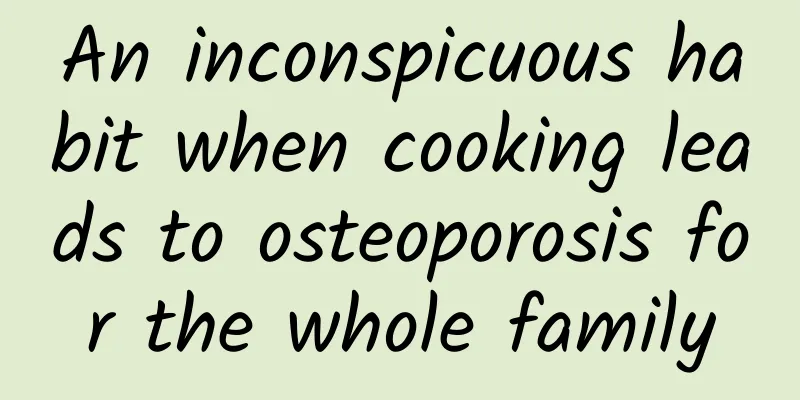An inconspicuous habit when cooking leads to osteoporosis for the whole family

|
An inconspicuous habit when cooking leads to osteoporosis for the whole family In daily life, salt is an indispensable condiment, but excessive salt intake may cause many harms to health, especially increasing the risk of osteoporosis. 1. Why does high salt lead to osteoporosis? Osteoporosis is a common bone disease, which is mainly manifested by decreased bone density, fragile bones, and easy fractures. About 200 million people suffer from osteoporosis worldwide, and a high-salt diet is one of its important risk factors. So, how does a high-salt diet lead to osteoporosis? Increased calcium loss Calcium is the main component of bones and maintains bone density and bone strength. When the human body consumes too much salt, the kidneys will accelerate the excretion of excess sodium ions. However, sodium and calcium are closely related in the metabolism of the kidneys, and the excretion of sodium will "drag down" the excretion of calcium. This means that a high-salt diet will lead to excessive calcium loss, which in turn affects bone health and increases the risk of osteoporosis. Studies have shown that for every gram of salt consumed, the amount of calcium excreted in the urine will increase by about 0.2 mg. A long-term high-salt diet will lead to continuous loss of calcium, which will eventually weaken the strength of bones. Inhibit osteoblast function Osteoblasts are key cells in bone formation, responsible for synthesizing and secreting bone matrix and promoting bone formation. A high-salt diet inhibits the differentiation and function of osteoblasts. Animal experiments have shown that a high-salt diet significantly reduces the activity of osteoblasts and reduces bone formation. In addition, a high-salt diet also activates osteoclasts and accelerates the decomposition of bone, thereby disrupting the dynamic balance of bone metabolism. The influence of parathyroid hormone A high-salt diet also stimulates the parathyroid glands to secrete more parathyroid hormone (PTH). The role of PTH is to regulate blood calcium levels. It activates osteoclasts and releases calcium from the bones into the blood. Although this mechanism maintains the stability of blood calcium in the short term, in the long run, it will lead to a decrease in bone density and increase the risk of osteoporosis. A high-salt diet can lead to an increase in acidic metabolites in the body, making the blood acidic. In order to maintain acid-base balance, calcium in the bones will be mobilized to neutralize acidic substances. This process will lead to the loss of calcium in the bones and weaken the strength of the bones. 2. The harm of osteoporosis Osteoporosis not only affects the quality of life, but may also cause serious health problems: Increased risk of fractures Osteoporosis can make bones fragile and prone to fractures. Especially for the elderly, the slow recovery after a fracture may lead to long-term bed rest and even endanger life. Hip fracture is one of the most common complications of osteoporosis, with a mortality rate of up to 20% and a disability rate of up to 50%. Decreased quality of life Osteoporosis may lead to problems such as shortened height and hunchback, affecting appearance and physical function. In addition, the long recovery process after a fracture will bring a heavy burden to patients and their families. Other health problems Osteoporosis may also cause other health problems, such as chronic pain, respiratory dysfunction, etc. Spinal fractures may cause chest deformation and affect lung function. 3. Other hazards of high-salt diet In addition to increasing your risk of osteoporosis, a high-salt diet can harm other systems in your body: High blood pressure A high-salt diet is an important risk factor for high blood pressure. Excessive sodium ions can cause water retention in the body, increase blood volume, and thus increase blood pressure. Long-term high blood pressure can also cause cardiovascular and cerebrovascular diseases such as heart disease and stroke. Studies have shown that reducing salt intake can significantly lower blood pressure and reduce the risk of cardiovascular disease. Increased burden on kidneys The kidneys are important organs for excreting excess salt from the body. Long-term high-salt diets increase the filtration burden on the glomeruli, leading to impaired kidney function and even chronic kidney disease. In addition, a high-salt diet also increases the incidence of kidney stones, because when too much calcium is excreted through urine, it is easy to combine with oxalic acid to form stones. Increased risk of gastric cancer A high-salt diet can irritate the gastric mucosa, destroy the protective function of the stomach wall, increase the risk of gastritis and gastric ulcers, and may even lead to gastric cancer. Studies have shown that a high-salt diet is positively correlated with the incidence of gastric cancer. Excessive salt can damage the gastric mucosa and promote the formation of cancer cells. Damage to the nervous system A high-salt diet may affect brain function and lead to cognitive decline. Studies have found that a high-salt diet can lead to a decrease in blood flow to the hippocampus of the brain, affecting memory. In addition, a high-salt diet may also increase the risk of Alzheimer's disease. Edema problem A high-salt diet can cause water retention in the body, which can easily lead to edema, especially lower limb edema. This edema not only affects the appearance, but can also cause joint pain and discomfort. Increased risk of obesity A high-salt diet may promote obesity through multiple mechanisms. On the one hand, excessive salt intake stimulates appetite and increases food intake; on the other hand, a high-salt diet can lead to water retention and weight gain. In addition, a high-salt diet may also affect the intestinal flora, further increasing the risk of obesity. 4. How to control salt intake scientifically? Reduce the intake of preserved foods Preserved foods often contain a lot of hidden salt. For example, foods such as ham and pickles have very high salt content. Learning to read food labels and choosing low-sodium or salt-free products can effectively reduce salt intake. Use low sodium salt Low sodium salt is a product that replaces sodium salt with part of potassium salt, which can reduce sodium intake without affecting the taste of food. However, it should be noted that patients with renal insufficiency should use low sodium salt with caution under the guidance of a doctor. Increase potassium intake. Foods rich in potassium (such as bananas, potatoes, and green leafy vegetables) can help reduce the negative effects of a high-salt diet. Potassium promotes the excretion of sodium, reducing the adverse effects of sodium on blood pressure and bones. Control your daily salt intake. The World Health Organization recommends that the daily salt intake per person should be limited to 5 grams. However, many people's actual salt intake far exceeds this standard. In order to reduce salt intake, you can try to replace salt with spices, lemon juice, vinegar and other condiments when cooking. For example, using spices such as ginger, garlic, and onions can increase the flavor of food and reduce dependence on salt. Regular physical examinations: Regularly monitor blood pressure, kidney function, bone density and other indicators to detect potential health problems in a timely manner. Especially for middle-aged and elderly people, it is recommended to have a bone density test once a year to detect osteoporosis at an early stage. A high-salt diet not only increases the risk of osteoporosis, but also harms the cardiovascular, kidney, gastrointestinal and other systems. In order to protect your health, develop scientific eating habits and control your salt intake. |
<<: What happened to those who wore headphones all year round?
>>: Do you want to vent your anger? Be careful about the harm this method may cause to your body
Recommend
More than 2 billion people are infected! Research shows that parasites can turn human cells into zombies
Science Fiction Network, December 19 (Xu Mingyang...
Why is the chicken breast so tough? How to fix the tough chicken breast
Chicken breast is the meat on the inside of the c...
Surprise! Forehead wrinkles are related to cardiovascular disease?
Have you ever looked in the mirror and suddenly f...
What scented tea can maintain the ovaries?
Some people think that scented tea is very good f...
What does the pomegranate symbolize? Is the pomegranate a tropical fruit?
Pomegranates are brightly colored and have many pl...
What to do if you have severe headaches in early pregnancy
Various reactions during pregnancy will be infini...
39 weeks pregnant vaginal pain
The pregnancy process is not as smooth as imagine...
Things to note before transplantation, pay attention to all aspects
Every woman has the right to be a mother. Some fa...
[Medical Q&A] How to properly handle and care for type 2 multiple nodules in bilateral breasts?
Planner: Chinese Medical Association Reviewer: Ko...
Taking supplements after uterine fibroid surgery
Uterine fibroids are a relatively serious cancer....
What to do if you have milk in your breasts after a miscarriage
If a woman finds that she has milk secretion afte...
Can I eat bananas after a miscarriage? The truth is this
Miscarriage is a situation that women often encou...
What to do when your eyes become dry during pregnancy
The body's response during pregnancy will cha...
What are the symptoms of night sweats in women?
What are the symptoms of night sweats in women? N...
Why do women have a strange smell?
Female friends sometimes smell a strange odor on ...









